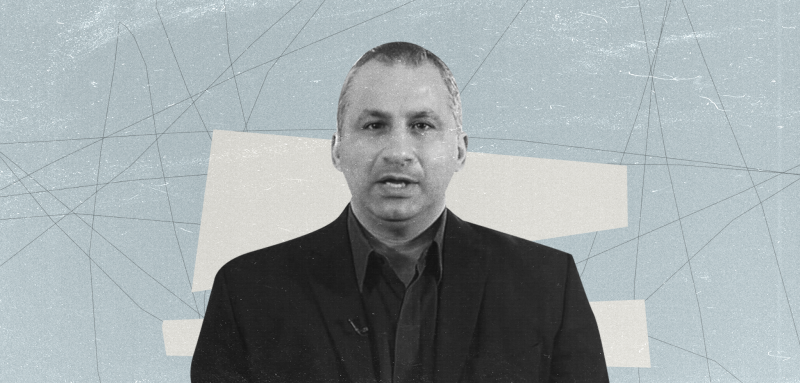In recent years, the name of Israeli journalist Edy Cohen has become widely recognized on Twitter. Renowned for his close ties to the Israeli security apparatus, Cohen presents himself as a multifaceted figure – an Israeli media professional, academic, and a senior researcher at Israel's Begin-Sadat Center for Strategic Studies. He claims to be an expert specialized in Arab affairs and the intricacies of the Arab-Israeli conflict.
Cohen's Twitter account became active in October 2012, tweeting and offering updates in both Hebrew and English only. It initially served to promote official Israeli news.
With time, Cohen's online presence transformed as his account evolved, particularly following his appearances as a "political analyst specializing in Arab affairs" on Arab and international channels. Since then, the majority of his tweets have shifted to Arabic, where he engages in discussions about incidents and issues concerning Arab nations, often dealing with them in a contentious manner that stirs up controversy and provokes the Arab public.
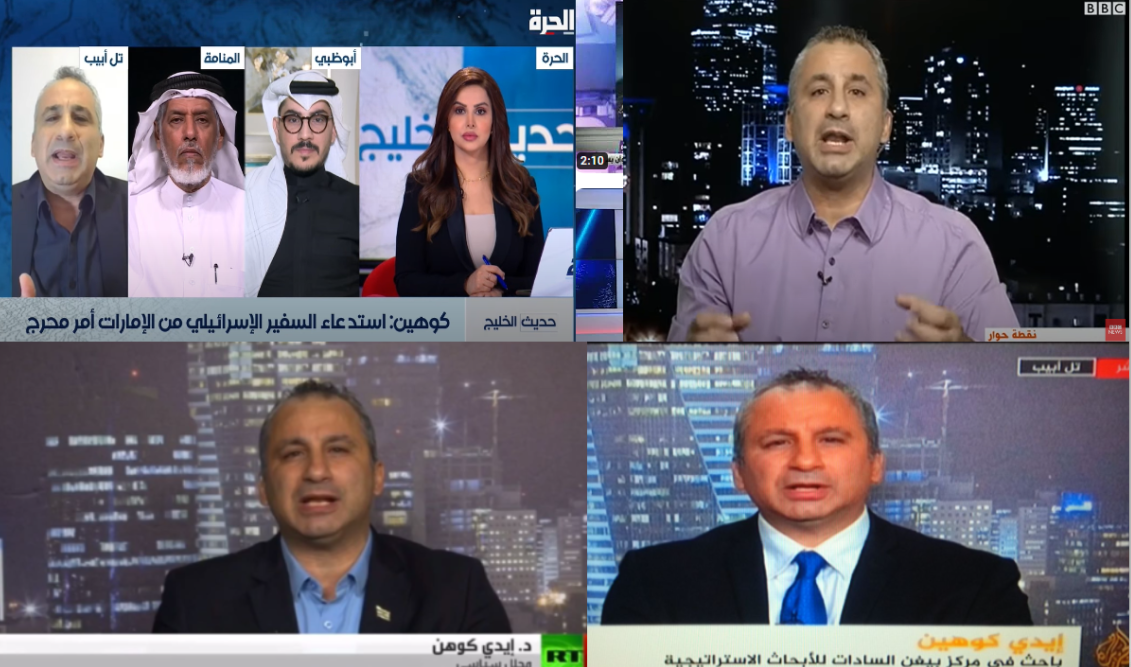 Edy Cohen on television interviews
Edy Cohen on television interviews
Driven by Cohen's deliberate spread of rumors and misleading news to create media uproar, Misbar, an independent fact-checking platform, has undertaken the task of tracking Cohen's Twitter account and the content of his posts. Its objective is to discern his ideological inclinations and the goals he pursues in deliberately disseminating deceptive information and provoking the Arab audience.
So, who is Edy Cohen and what does he do on Twitter?
Who is Cohen? What is his online agenda?
According to Misbar, the original name of Edy Cohen is Edward Chaim Cohen Halaleh, born in 1972. While there isn't much detail available about him, he is said to be an Israeli researcher with Lebanese-Arab roots, who was born and raised in Beirut before migrating with his family to settle in Tel Aviv. This background likely accounts for his proficiency in the Arabic language. Misbar's analysis indicates that approximately 90% of Cohen's Twitter content is in Arabic.
Nowadays, due to his contentious and controversial content on Twitter, Cohen has ascended the ranks to become one of the prominent Israelis in the Arab world, alongside Avichay Adraee, the spokesperson for the Israeli army, who is also fluent in the Arabic language.
Edy Cohen's original name is Edward Chaim Cohen Halaleh, born in 1972. While there isn't much information available about him, he is said to be an Israeli researcher with Arab roots, who was born and raised in Beirut before emigrating to settle in Tel Aviv
Presently, Edy Cohen boasts a following of more than 571,000 individuals on Twitter. On average, his tweets gather between 20 to 50 likes per post, although this number often spikes to 100 or more for controversial topics. His most provocative tweets, particularly those addressing matters of public interest, usually accumulate between 500 to over 1,000 likes.
His tweets, which question topics related to the Arab region in a skeptical and sarcastic tone, tend to receive a higher level of engagement.
Cohen's purposeful dissemination of contentious and questionable content, often intertwined with conspiracy theories, skillfully exploits the platform's algorithms to promote his content and enhance its visibility to a broader target audience.
Evidently, Cohen's focus includes critiquing manifestations of authoritarianism, corruption, and developmental issues in Arab countries. He draws parallels between them and the political and economic situation in Israel, with the obvious intention of underscoring the idea that Israel is the "sole democratic and flourishing state" in the region, amidst the backdrop of Arab divisions and fragmentation.
Noteworthy is Cohen's particular emphasis on Egypt, often discussing President Abdel Fattah el-Sisi, alongside the Jordanian monarchy. Additionally, he frequently addresses Syria, Iran, Turkey, and Gulf nations.
Cohen deliberately – and strategically – tarnishes the reputation of Palestinians, Palestinian political factions, and the Palestinian resistance, specifically targeting them to discredit their stance.
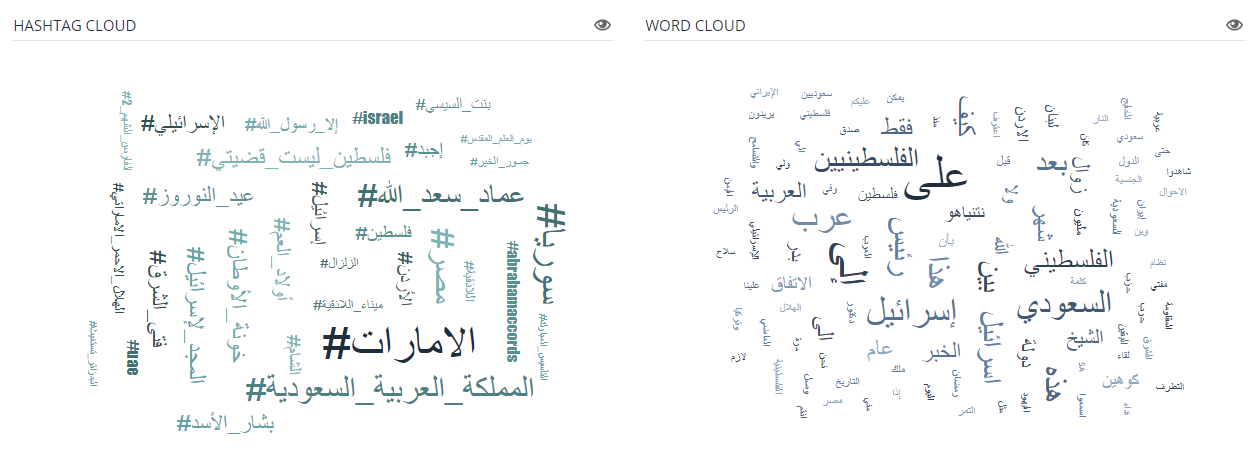 A selection of Arabic words and hashtags recently used by Cohen, alongside other pro-Israeli hashtags
A selection of Arabic words and hashtags recently used by Cohen, alongside other pro-Israeli hashtags
A selection of Arabic words and hashtags recently used by Cohen, alongside pro-Israeli hashtags such as, #PalestineIsNotMyCause and #GloryToIsrael
Among the myriad misleading claims and allegations propagated by Edy Cohen's Twitter account, aimed at sowing discord among Arab populations, was a video featuring a man dressed in religious attire within the premises of Masjid al-Haram in Mecca, discussing traversing between Safa and Marwa. Cohen insinuated that the man was a Palestinian mufti questioning Saudi scholars and challenging their teachings to sow discord with his words.
Cohen shared the video with the caption: "No one can fathom the Palestinians' animosity towards Saudi Arabia and all things Saudi." Misbar determined that the individual in the video was actually Lebanese religious scholar Jameel Halim Husseini, the head of the Sufi Sheikhs Association in Lebanon. There is no connection between the actual Palestinian mufti and the video in any way or form.
In another video posted by Cohen, he claimed it depicted a "recent" incident in Egypt where a Saudi tourist was denied entry to a tourist restaurant for donning a traditional Saudi robe. He shared the video with the comment: "All Saudis are welcome in Israel, with your Saudi attire and jalabiya. No need for the insults you are subjected to in Egypt."
Misbar revealed that the incident had occurred eight years ago and the Egyptian government had already issued an apology at that time. The then-Minister of Tourism, Khaled Ramy, personally met and apologized to the Saudi tourist and the restaurant was closed down due to its "actions that tarnished the country's tourism reputation."
A substantial portion of Cohen's followers, alongside other Arabic-speaking pro-Israeli propaganda accounts, consist of undercover Israelis using Arab aliases to mislead Arab audiences. Genuine Arab engagement with his content is divided into two categories
Who aids Cohen?
Addressing Gulf audiences directly and intensively, Cohen promotes the notion that there are various issues aligning Israeli and Gulf political interests. This effort coincides with his regular tweets suggesting that the Palestinian people harbor presumed hostility towards the Gulf and its inhabitants.
Within his tweets, he urges Arab nations and individuals to normalize relations with Israel, bearing in mind that his focus on Gulf states has notably intensified following the UAE and Bahrain's normalization of relations with Israel.
In a statement to Al-Hurra, Cohen claimed that Saudi Arabia has been actively working for years to establish a foundation for normalization with Israel. Cohen's objective is to appeal to Arab communities, encouraging them to open a new chapter with Israel and embrace their Jewish and Israeli neighbors. He has repeatedly stated that the Arab-Israeli conflict has ended, asserting that "no Arab state is currently considering the prospect of war with Israel, following these treaties." He emphasizes that the conflict will remain Palestinian-Israeli only.
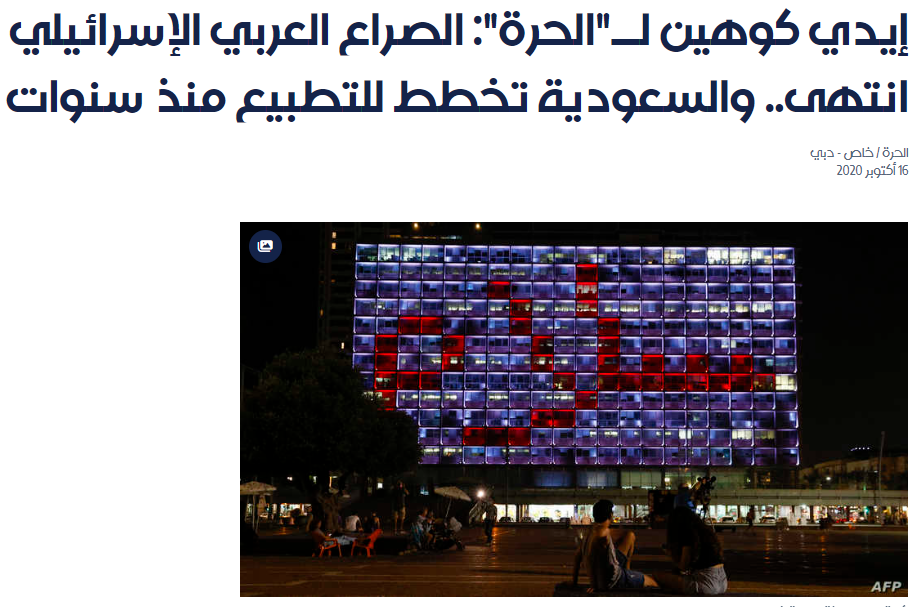 Edy Cohen talks to Al-Hurra about normalization with Saudi Arabia
Edy Cohen talks to Al-Hurra about normalization with Saudi Arabia
In his work promoting normalization, Cohen doesn't work alone; he consistently engages with tweets attributed to accounts bearing Arabic names that exclusively champion Israel and tout the "benefits" of normalization. He shares the posts from these accounts that, in turn, retweet his own posts.
Even though some of these tweets are attributed to real Arab figures who openly endorse normalization, many of them appear to be fake accounts, seemingly created with the specific intent to persuade Arab followers to embrace the concept of normalization.
Among the noteworthy accounts actively interacting with and vigorously endorsing Edy Cohen is the account of Badr Al-Saadoun, purportedly a Saudi citizen residing in Riyadh. Similar to Cohen, little information is available about Al-Saadoun. His followers amount to approximately 20,000, and he was once featured in an interview with Edy Cohen on the Israeli Tov News website, where he was introduced as a "Saudi activist".
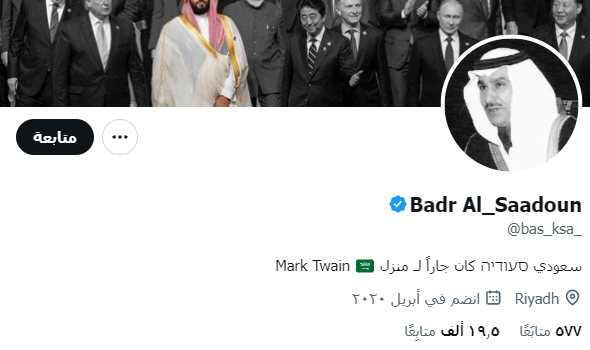 Badr Al-Saadoun Twitter account
Badr Al-Saadoun Twitter account
Based on Misbar's analysis, Al-Saadoun's account was established in April 2020 and is operated from Saudi Arabia. Notably, a mere 4% of its tweets are original content, with over 20% being retweets, while about 76% constitute comments.
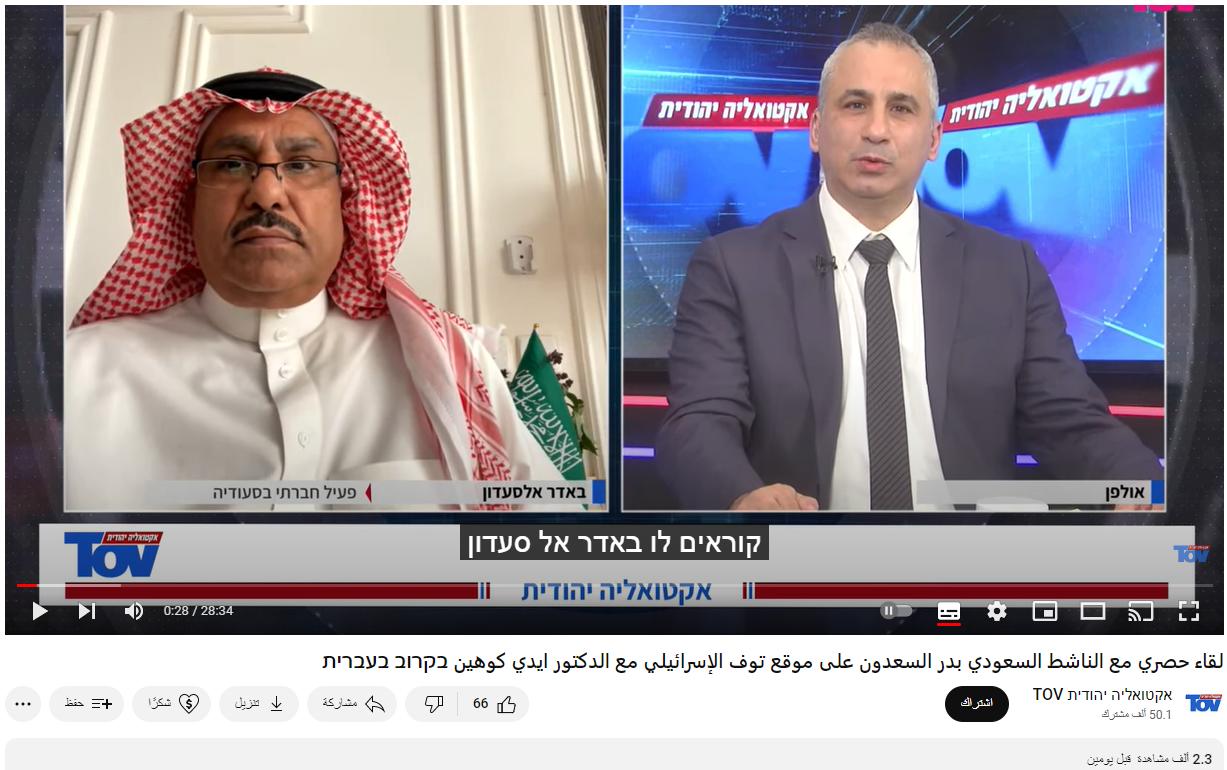 Badr Al-Saadoun's only appearance
Badr Al-Saadoun's only appearance
Mainly, the account is centered around a negative portrayal of Palestinian matters, including casting doubts on the right of the Palestinian people to their land while heaping praise on Israel. The account holder has even once referred to themselves as an "Arab Hebrew", frequently posting tweets using hashtags such as #PalestineIsNotMyCause and #GloryToIsrael.
Another account that Cohen consistently promotes is the "Sfouk Al-Sheikh" account, which self-identifies on Twitter as the "leader of the enlightenment revolution in the 21st century". Al-Sheikh, who established the account in December 2020, asserts that he is of Syrian origin and takes pride in his "Zionism and support for Zionism."
Cohen's online presence gradually evolved after appearing as a "political analyst specializing in Arab affairs" on tv channels. Most of his tweets have since shifted to Arabic, addressing issues concerning Arab nations in a controversial and provocative manner
The account has approximately 35,000 followers and frequently shares a plethora of videos that mock Arabs and Muslims, ridiculing and disrespecting them, all while consistently attempting to tarnish the image of Palestinians.
Numerous Israeli accounts actively work to amplify the Sfouk Al-Sheikh account, seeking to portray it as "an Arab citizen speaking rationally and authentically" about the origins of the Arab-Israeli conflict. One such account is "Israel in Arabic", affiliated with the Israeli Ministry of Foreign Affairs, which has actively propagated videos from Al-Sheikh, who often tweets from locations such as the United States or Saudi Arabia.
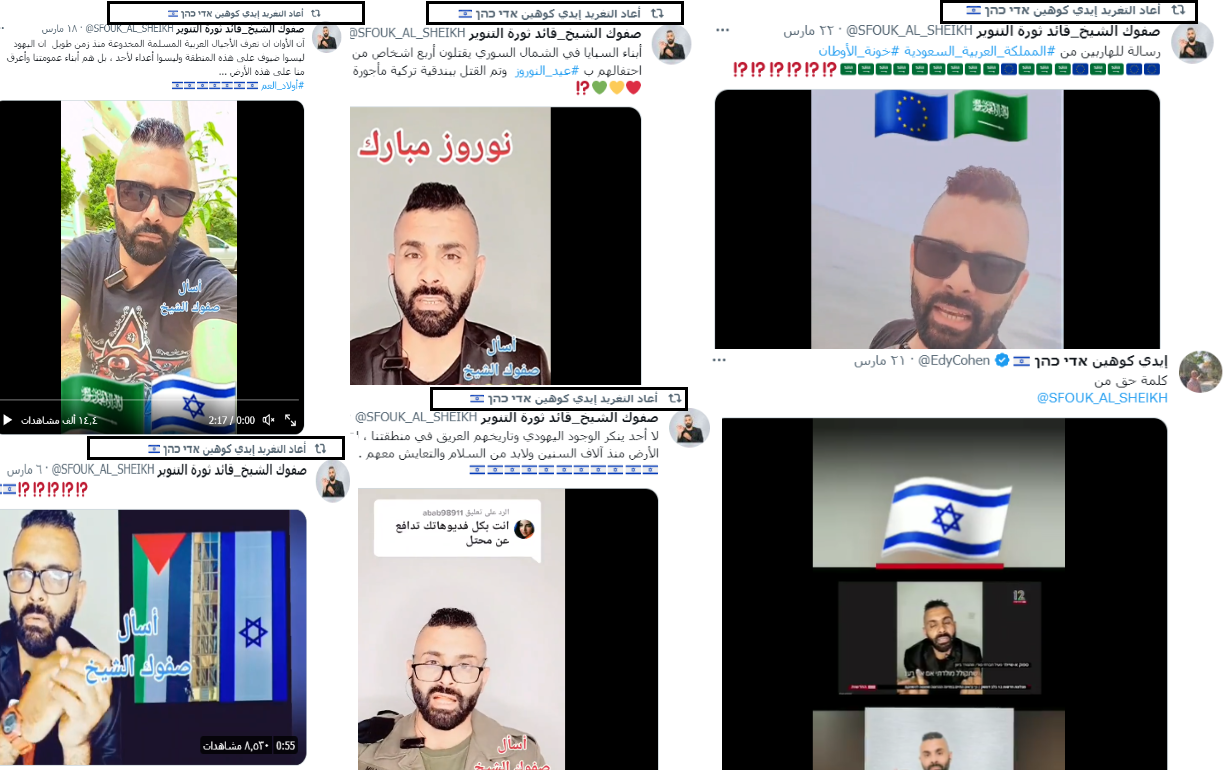 The pro-Israeli accounts that Edy Cohen interacts with
The pro-Israeli accounts that Edy Cohen interacts with
The revelations from Misbar's analysis shed light on the presence of numerous questionable and suspect accounts that regularly engage with Cohen. Among these are hundreds of "fake" Israeli accounts that lack any clear backgrounds or definitive identities. Interestingly, many of these accounts appeared on Twitter at the outset of the current year, and their activity is confined to following well-known figures linked to the Israeli government, and do not publish any tweets or posts. This hints at the potential existence of a network of fabricated Israeli accounts, orchestrated to bolster and amplify Cohen's presence along with similar social media accounts.
In addition, Misbar's investigation unearthed a multitude of fake and inactive Twitter accounts that assume Arab names and actively follow Cohen's updates. A considerable number of these profiles emerged in recent months and display minimal to no discernible activity.
One such account, under the name "Emad Saadallah," surfaced in mid-March 2023, purportedly asserting candidacy for Egypt's forthcoming presidential elections set for 2024.
This alleged account of the "future president of Egypt" shared, among other things, a video that contested Palestinian ownership of the Holy Land, positing it as belonging to the Israeli people instead. Cohen shared the video with an approving comment, "Bravo, words of truth from the future president of Egypt." In response, Saadallah posted another video expressing gratitude to Cohen for his remarks.
Since then, this account has been publishing videos denying the right of Palestinians to their land, asserting Jerusalem as Israel's capital, and even advocating for the expulsion of all refugees from Egypt. Cohen consistently shares and retweets these videos.
Yet, details remain elusive regarding the Saadallah account, which seemingly takes an opposition stance against the Egyptian regime while simultaneously ramping up its pro-Israel content.
A united Israeli disinformation machine
In sum, Misbar's comprehensive analysis concludes the Edy Cohen account is one of the many Israeli accounts present in the Arabic online sphere that systematically target Arab audiences, skillfully glossing over and whitewashing Israel's image for them while concurrently distorting and casting a shadow over Palestinians. This calculated effort also appears designed to sow division within Arab nations and communities whenever the opportunity arises.
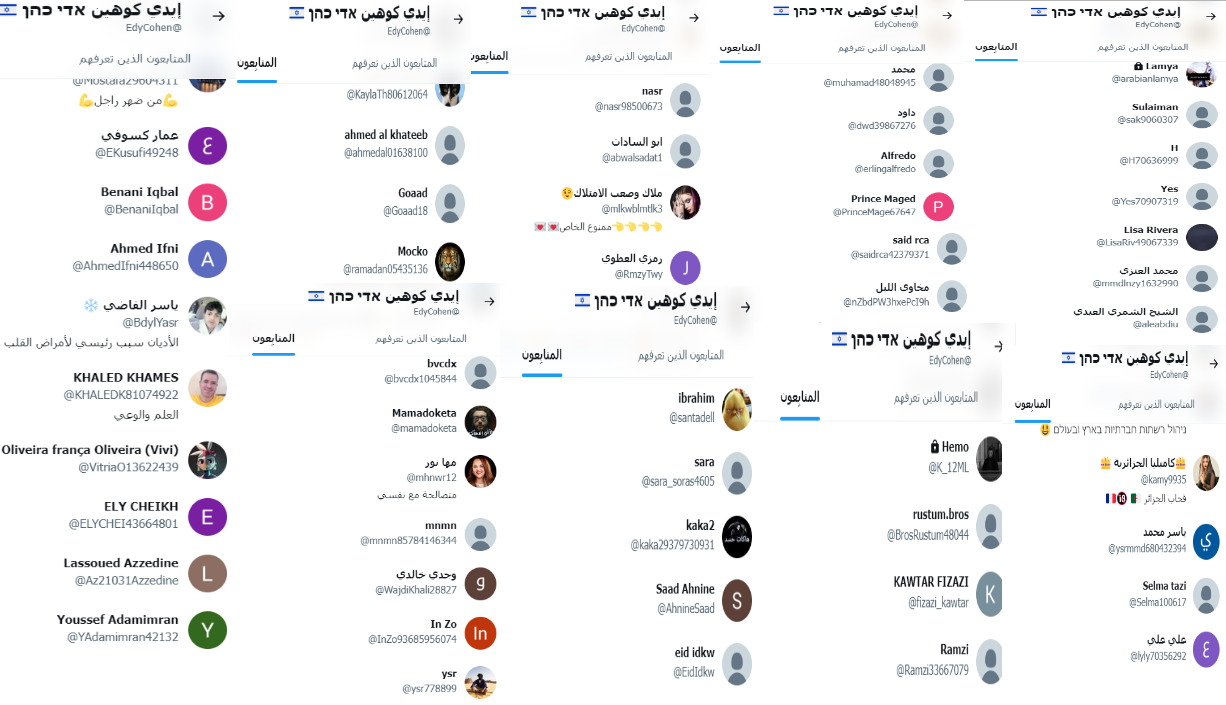 Pro-Israeli accounts and posts
Pro-Israeli accounts and posts
Earlier analyses have highlighted the existence of Israel-aligned accounts striving to penetrate Arab communities by engaging them in their native language. These accounts spread lies and misleading propaganda, with the underlying goal of normalizing ties with Israel, whitewashing its image, and furthering its political agendas, while tainting the reputation of the Palestinian people who are fighting for the right to their own land.
Edy Cohen's account is one of many Israeli accounts present in the Arabic online sphere that systematically target Arab audiences, whitewashing Israel's image while distorting Palestinians to sow division within Arab nations whenever the opportunity arises
According to Misbar, "These accounts also aim to depict Israel as the only democratic country in the Middle East, a humane state that is victim to violence and terrorism. This could result in a distortion of public opinion, concealing a history of colonization, violence, killing, and forced displacement."
The observatory cites an example of this, when Avichay Adraee's account tweeted on the first day of Ramadan earlier this year, to share an image of a Palestinian child seemingly waving at occupation soldiers near Bethlehem's Rachel Border crossing. Adraee asserted that the image "summarizes a thousand words, exposing anyone who incites and spreads hatred". Edy Cohen retweeted the image with the remark "Far from the lies of Palestinians." However, official data and human rights documentation underscore that Israel had killed five Palestinian children in less than a month at the start of the year. In addition, rights organizations documented the killing of at least 50 Palestinian children in 2022 alone.
Misbar's analysis underscores that a considerable proportion of followers of Cohen's account and other Arabic-speaking Israeli accounts are, in fact, undercover Israelis camouflaging themselves under Arab aliases to deceive Arab audiences.
As for authentic Arab engagement with these accounts, it is divided into two categories. The first comprises advocates and supporters of the Palestinian cause who follow Cohen to vocally defend it and rebut his tweets with facts and counterarguments. The second category includes users who find no qualms in normalizing relations with Israel. Misbar also notes that a small group of Arab tweeters "engage earnestly, oblivious to the ramifications of their interactions."
Raseef22 is a not for profit entity. Our focus is on quality journalism. Every contribution to the NasRaseef membership goes directly towards journalism production. We stand independent, not accepting corporate sponsorships, sponsored content or political funding.
Support our mission to keep Raseef22 available to all readers by clicking here!
Interested in writing with us? Check our pitch process here!
